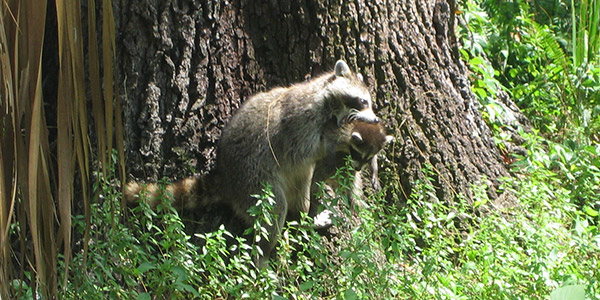The Raccoon
The majority of people will be familiar with the raccoon from a famous cartoon series, but there is a lot more to this fascinating animal than simply cute and attractive features. There is no doubt that the raccoon is a very versatile and adaptable animal, and has spread from it’s origins in forested areas to be comfortable living in many different types of surroundings.
Biology And Appearance
The raccoon is the biggest member of the procyonid animal family, and are easily identified by the distinctive facial features. Having short legs and a stout body, the raccoon is one of the most common wild animals to be found in North America. The animal itself will usually grow between two feet and three feet in length, although the bushy tail will often account for up to a foot of this size.
Generally, the raccoon will have a thick coat of dark grey, black and brown, which is very warm to compensate for the cold weather which the raccoon will often have to survive through. The facial features are what make the raccoon such an attractive animal, and the contrast between the white face and black patches around the eyes give it quite a cute demeanor. The male is generally heavier and will usually be around a fifth larger than his female counterpart.
 Behavior and Life Cycle
Behavior and Life Cycle
The life span of the raccoon can vary greatly between the animals that are found in the wild and those that are kept in captivity. In the wild the raccoon will rarely live for over three years, while those who have been born and raised by men have been known to live for over twenty years. For the most part raccoons will only be active at night, but some have been known to hunt in the day if there is a better food source available at that time.
Although raccoons were long thought to be quite lonesome animals, studies have shown that they will form alliances with other animals of the same sex. Females will often share an area of habitat and will meet occasionally, while the males will often form small groups to share an area and to help fend off other animals. The mating season for raccoons will generally be in the spring, and the litter will usually be born around two months afterwards, with the females taking all responsibility for raising the kits.
One oddity in the behavior of the raccoons is that they will generally douse their food before eating, and will use their highly sensitive forepaws to remove any parts that they don’t want to eat and can even use this sensitivity to find earthworms in the ground.
Habitat And Diet
Although the raccoons originated in the forests of North America, their thick fur and adaptability has meant they have thrived in mountainous areas, marshland and even urban areas.
The raccoon is omnivorous, and will eat anything that they can find that is edible. Generally their diet will consist of slightly more earthworms and other invertebrates than any other food source. This is quite well balanced with an intake of small vertebrates and plants.
Conclusion
The raccoon is one animal which has adapted well to human invasion of its habitat, and those that scavenge in urban areas are generally successful. This leads to many people thinking of them as a pest, and the hunting and trapping of these animals is common. The raccoon has been known to carry rabies, although a vaccination program has reduced the prevalence of the disease. The raccoon is an animal that can show many different attributes depending on its habitat and the food that it can find.
Go back to the
How To Get Rid of Raccoons home page.
Read about
Is raccoon feces dangerous to health?
Read about
Do all raccoons have rabies?
Read about
Do more raccoons live in the country or city?
Read about
Do mothballs repel raccoons?
Read about
What damage do raccoons cause inside a house?
Read about
How to get raccoons out of the chimney.
Read about
How to get raccoons out from under a deck.
Read about
Do raccoons make good pets?
Read about
How do I clean my attic after a raccoon?
Read about
How do you remove a raccoon stuck in a dumpster?
Read about
What should I do if I find an orphaned baby raccoon outside?
Read about
How to keep raccoons out of my garden.